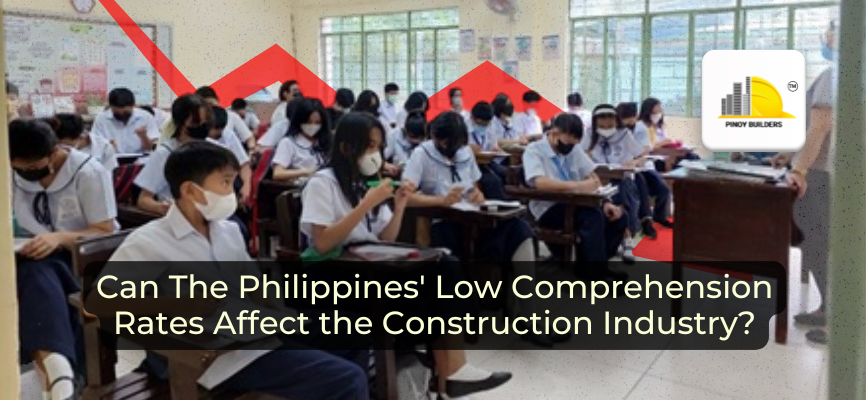The 2024 Functional Literacy, Education and Mass Media Survey (FLEMMS) report revealed a troubling reality: almost 19 million junior high school graduates in the Philippines are considered functionally illiterate. This figure challenges assumptions about what it means to complete basic education.
Functional illiteracy does not only pertain to the inability to read and write. Rather, it defines people who can technically read and write but struggle when it comes to comprehension. This characteristic can be seen in their difficulty in showing essential skills in many industries, such as clear instructions, interpreting signals and signs, and grasping technical concepts.
So, what happens when this issue intersects with construction?

Image credit: GMA News
Functional Illiteracy In the Construction Industry
Literacy is a critical skill in the construction industry. Safety warnings and clear instructions are essential, and not being able to comprehend them increases the risk of accidents, miscommunication, and overall setbacks in construction.
Functionally illiterate individuals may be able to sign their names and read simple words but often fail to understand safety warnings, work orders, or equipment manuals. Unlike basic illiteracy, this gap is harder to detect until the person is already in a role where comprehension is critical.
Why The Construction Industry Should Pay Attention To Local Literacy
There’s more to construction than just physical labor. Critical thinking and professional comprehension skills are essential for all workers across every branch, from design all the way to execution.
In construction, functional literacy is a core skill for every worker. From reading plans to following basic safety protocols, these are everyday occurrences, and everyone should be equipped with the comprehension skills required to operate in the field. That is the minimum requirement.
Literacy expectations also extend to adapting digital systems to executing modular construction techniques. But with the functional illiteracy rate rising to 18.9 million this year, all industries, including construction, face risk.
The bottom line is: communication, accuracy, and understanding are core skills for every construction job. At the same time, the sector is already facing a skills mismatch and labor shortage.
What the Numbers Reveal
FLEMMS data shows that 21% of senior high graduates lack functional literacy. Though direct studies linking this statistic to the construction industry are limited, the implication is clear. With the government pushing large-scale infrastructure projects and TESDA advocating for technical-vocational training, comprehension issues could affect both safety and output.
What’s Being Done—and What’s Missing
Programs by TESDA and industry groups help certify and train workers. But the gap in comprehension needs more than broad education reforms. Tailored interventions such as job-specific reading support, on-site coaching, and assessments could help reduce misunderstandings that lead to costly mistakes or accidents.
As for the current rate of national functional illiteracy, DepEd chief education program specialist Rosalina Villaneza told the Senate basic education hearing committee that the department will be conducting an assessment for the Philippine Informal Reading Inventory (PHIL-IRI) in the next school year to come up with a solution.
Committee chairperson Senator Sherwin Gatchalian also emphasized the need for a more proactive approach to solve the national education crisis.
“Definitely, we cannot just sit down and sleep well at night knowingly that we have constituents who cannot read, write and compute. Because as long as there’s somebody who cannot read, write and compute, there will be poverty in our country. So we need to break that cycle of poverty by injecting education.”
Who’s Preparing the Builders?
There’s no question that more research is needed to trace direct impacts. But with millions struggling to comprehend essential information, the construction industry and others like it must start asking the right questions. As the country builds more roads, bridges, and buildings, what are we doing to make sure that students today can enter the workforce and contribute to our country’s goal of becoming a hub for construction innovation?
If we’re building more, who’s preparing the builders?
Works Cited
BORDEY, HANA. “PSA: Over 18M high school grads don’t understand what they read.” GMA Network, 30 April 2025, https://www.gmanetwork.com/news/topstories/nation/944513/over-18m-filipino-high-school-graduates-can-t-comprehend-2024-psa-study/story/. Accessed 2 May 2025.
Dagooc, Edha M. “Manpower shortage likely to push construction costs.” The FREEMAN, https://www.philstar.com/the-freeman/cebu-business/2024/10/15/2392649/manpower-shortage-likely-push-construction-costs.
“Exploring construction workers’ attention and awareness in diverse virtual hazard scenarios to prevent struck-by accidents.” Science Direct, https://www.sciencedirect.com/science/article/pii/S0925753524001164.
Newsbytes.PH. “Gov’t study says labor sector plagued by skills mismatch.” Newsbytes.PH, 30 October 2024, https://newsbytes.ph/2024/10/30/govt-study-says-labor-sector-plagued-by-skills-mismatch/. Accessed 2 May 2025.
“Why low levels of literacy may be holding the UK construction industry back.” MODUS Journals, https://ww3.rics.org/uk/en/journals/construction-journal/why-low-levels-of-literacy-may-be-holding-the-uk-construction-industry.html.










